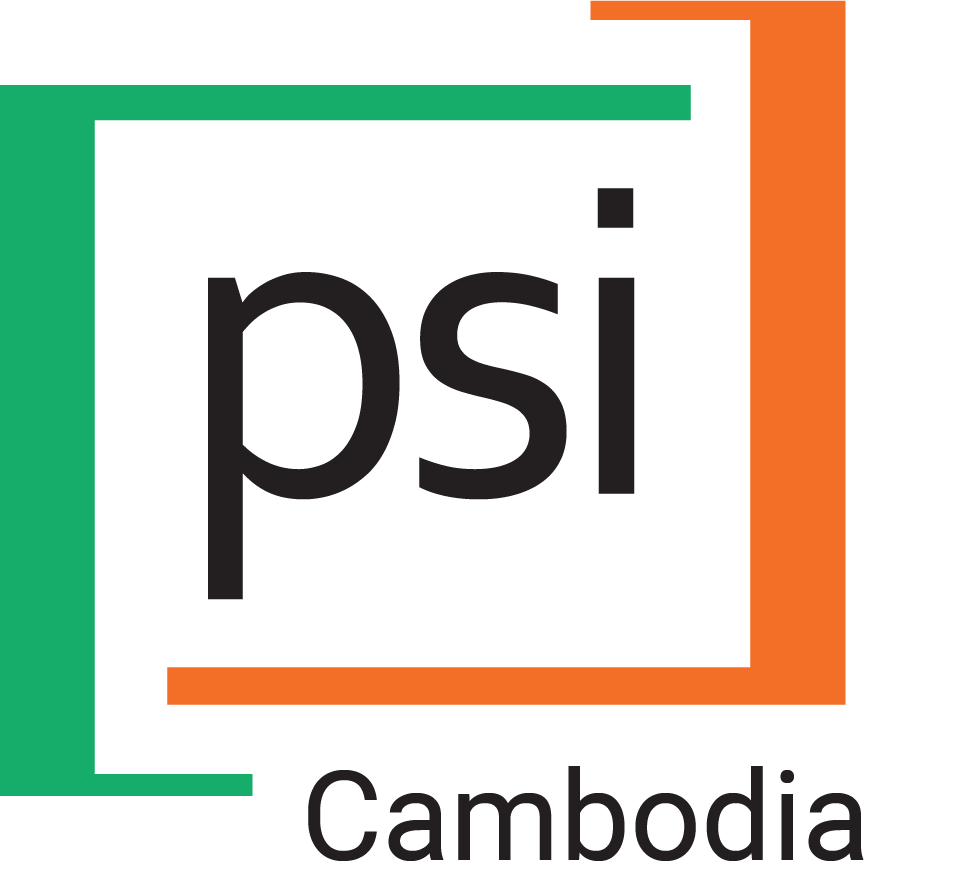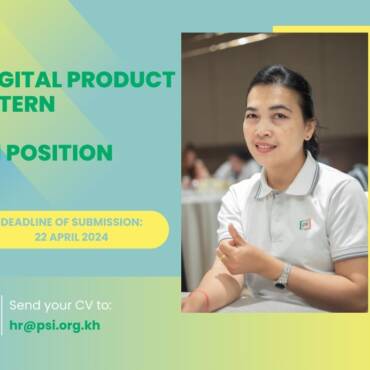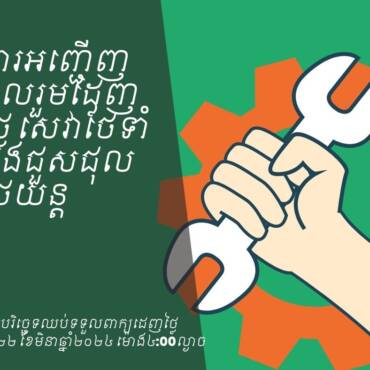Modern Methods of Family Planning to Prevent Unplanned Pregnancy and Provide Adequate Quality of Life and Care to Family in Rural Cambodia
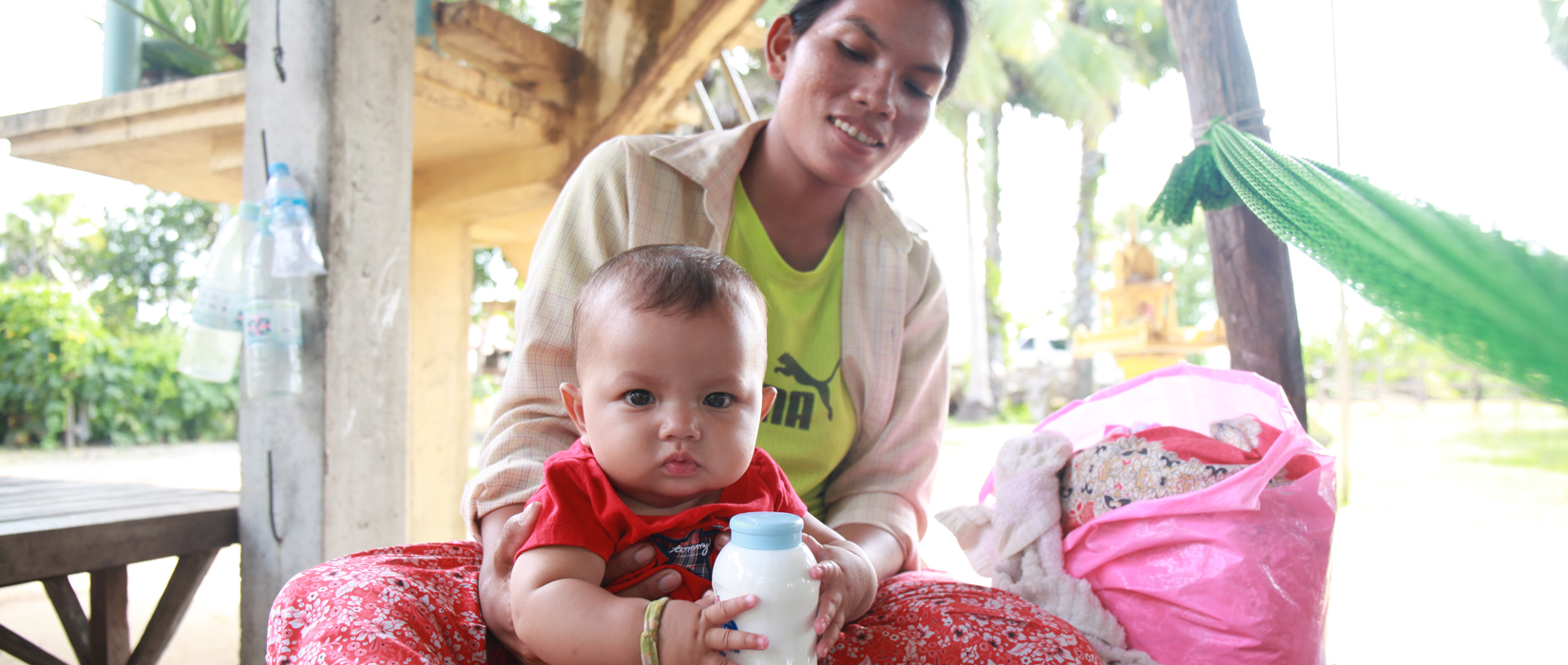
Family planning using modern methods (MM) is vital to prevent unplanned pregnancy which gives couples better control over their life choices and to provide quality care to their children and families without experiencing financial hardship. It also safeguards the health of mothers and their young children and maintains adequate quality of life. In rural Cambodia, information and access to MM of family planning can be a challenge to come by and often information may be brief and without follow up due to limited services at the health facilities and the long distance for couples to travel.
A common source of MM information in the community is through word of mouth among friends and families and often it is partial, inaccurate and can lead to and/or perpetuate misconceptions and lack of confidence regarding MM. For example, it is commonly believed that MM are ineffective, may cause harm to women and make them difficult to conceive in the future or infertile. Additionally, it may be challenge for many Cambodians to engage in discussions on MM due to its sensitive nature associating with sex and sexual practices. As a result, many Cambodians are reluctant to adopt MM especially in the rural area that can lead to unplanned pregnancy and family financial hardship.
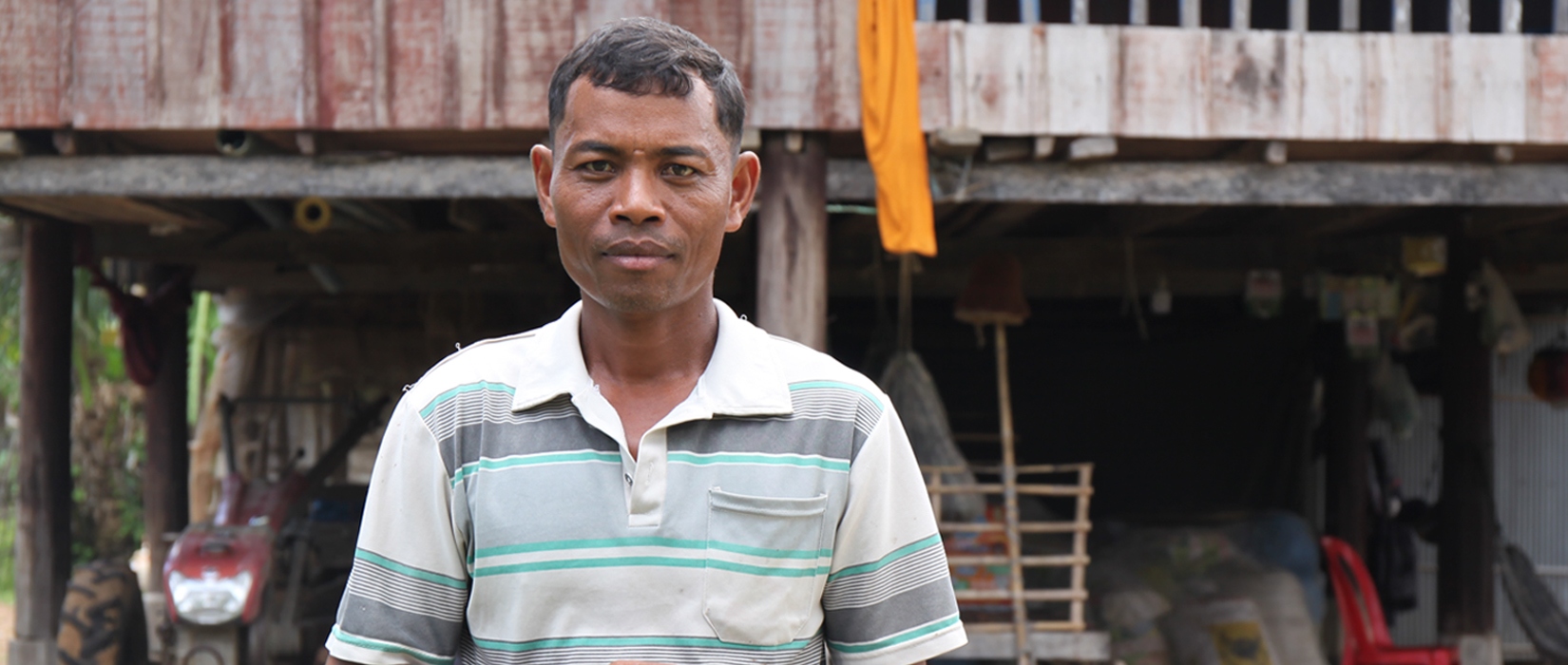
“We thought about family planning after the first child and to plan for a better family life so we decided to use male condoms. We then waited until timing is right with sufficient income to have another child.” – Mr. Chhum Pohn, Chak Village, Kampong Chhnang.
Across Cambodia, strides have been made regarding increasing use of MM for family planning (from 39% in 2014 to 52% in 2017). However, certain segments of the population have shown less progress and much work is needed to ensure all Cambodians can meet their family planning needs.
To address this problem the USAID-funded Promoting Healthy Behaviors Project (PHB) has designed and implemented a social and behavior change (SBC) intervention with local partner Partners in Compassion (PC) in Kampong Chhnang province since July 2020 to increase knowledge, change perceptions, and increase adoption of MM. The intervention coverage includes nine health centers, 13 communes and 68 villages across two operational districts (ODs). Based on research and insight gathered, two intervention concepts “Loving Relationship” and “Heart Protector” are designed, and SBC activities developed to 1) dispel persistent myths and misperceptions about MM, 2) encourage couples to discuss MM and make decisions together, and 3) have men start talking to their wives about MM.
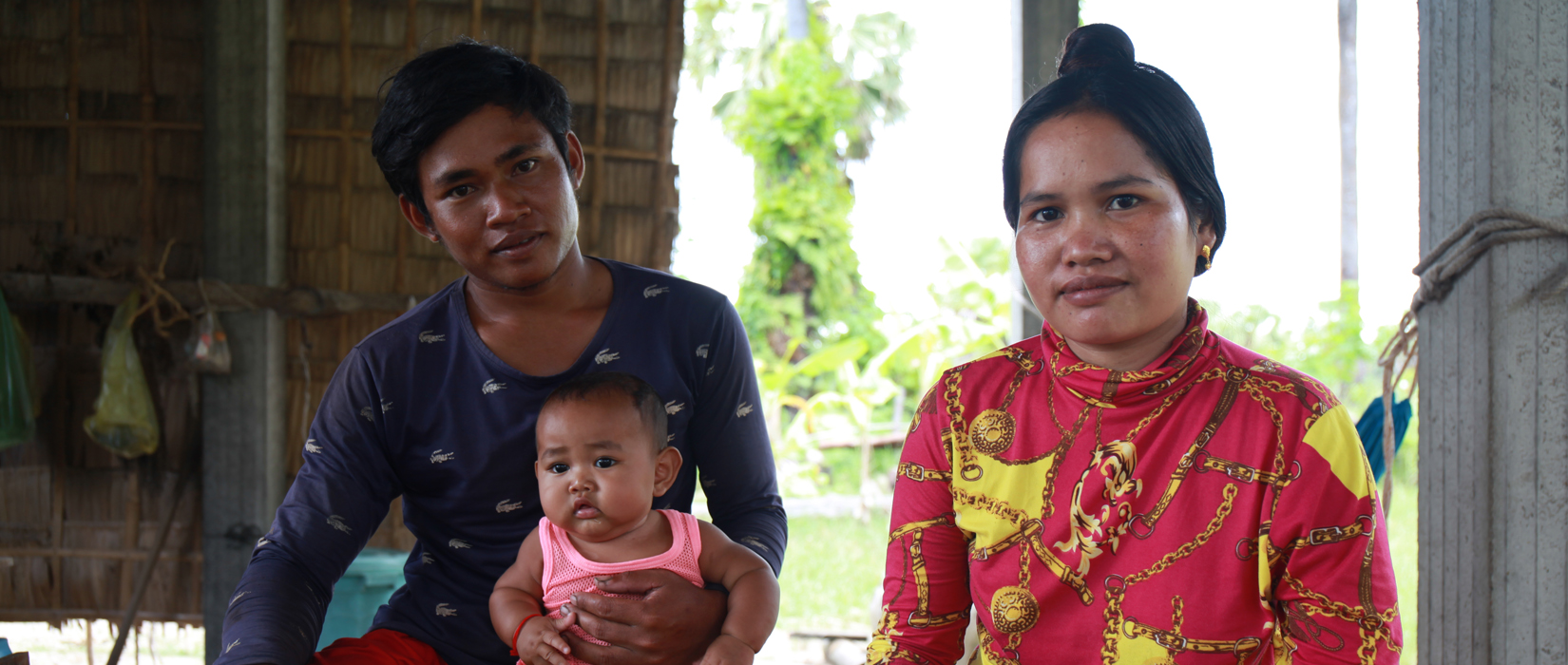
“Me and my husband were concerned with unplanned pregnancy because it is expensive and time consuming to raise children. Learning about modern methods and family planning helps a lot!” – Mr. Ol Sokun & Mrs. Peh Yein, Married Couple, Kraing Skear Village, Kampong Chhnang
“Loving Relationship” is an intervention designed to encourage couples to discuss MM. The aim is to provide couples with accurate and up-to-day information on MM in a safe space that will facilitate frank discussion and to allow couples to make informed decisions on their family planning needs together. Four to Five couples are invited by village volunteers, often village chiefs or village health support group (VHSG) volunteers to attend an evening couple session with an Interpersonal Communication (IPC) agent from PC facilitating discussion on family planning, framing it as an important part of an intimate relationship. During the session, couples participate in fun and engaging activities to learn about various MM and dispel common misconceptions.
A range of tools were developed and are used during the session including a video to identify common myths around MM; a “true or false” game to dispel myths identified; a set of dating connection cards to remind couples of their love journey; a loving relationship booklet with information on MM, photos of contraception products, FAQs, myths and contacts for further information for couples to review in session and to take home. A range of real MM products such as implants and IUDs are also presented to reduce fear on and de-mystify MM.
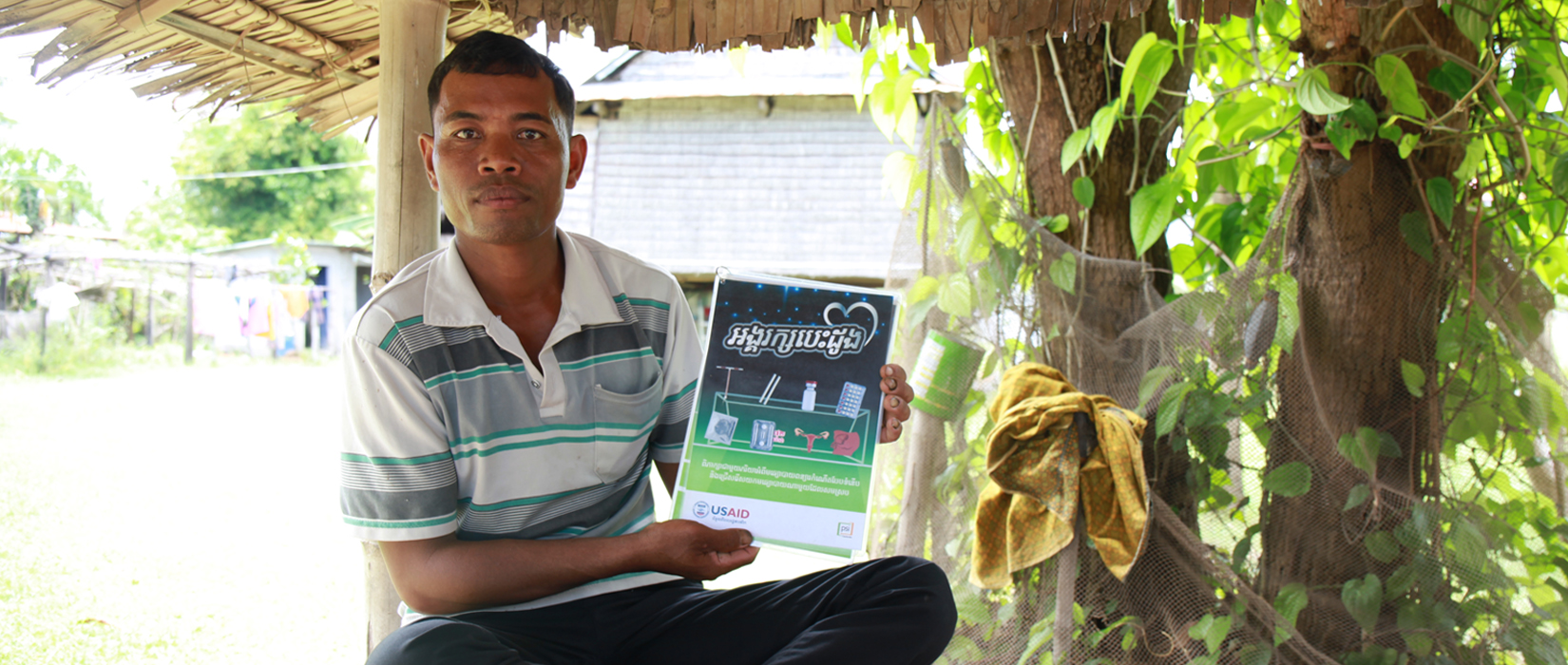
“I have leant more details about each modern methods after joining the men’s session, most importantly, the session encourages and gives me the right information to decide the best suitable option for me and my wife.” – Mr. Chhum Pohn, Chak Village, Kampong Chhnang.
“Heart Protector” is an intervention designed to engage with men with an understanding that it is often easier for men to discuss sensitive topics such as family planning in a men only environment. Similar to the couple session, eight to ten married men are invited by VHSG volunteers to attend each session facilitated by a male IPC agent. During each session, men share their experiences of family planning and are introduced to MM options to dispel misconceptions and to discuss concerns. The aim is to encourage men to discuss family planning and MM options with their wives. Key chains with photos and information of MM with a call to action – “talk to your partner about which MM of family planning would be right for your family” are given to each participant. Additionally, goalkeeper games are conducted regularly as a metaphor to demonstrate that a goalkeeper (traditional method) supported by other defenders (MM) are more effective in blocking a score (preventing unwanted pregnancy).
Follow-up household visits are carried out by IPC agents after sessions to provide more individualized discussions on couples’ concerns and questions and to provide referral to health facilities to access MM of their choice. Additionally, to encourage postpartum discussion on MM, IPC agents distribute handy sleeves to health centers in the intervention areas to give to postpartum women to store their children’s immunization cards when discharging from the health center. Each sleeve contains a family planning hotline for further information, a reminder that women can become pregnant within four to six weeks of giving birth and to adopt/readopt a MM.
A common motivator to adopt MM is revealed during interviews with a married couple and a father in Kampong Chhnang province in September 2022. All interviewees expressed a strong desire to prevent unplanned pregnancy to ensure quality care to their children and sufficient income to provide for the family. Mrs. Peh Yein from Kraing Skear village stated that after receiving information from the IPC agent, she and her husband decided that hormone injection every three months is the best choice for them. She further stated that MM helps her and her husband to have more time and resources to care for their six-month old baby Mineak and to ensure both she and Mineak are healthy.
Mr. Chhum Pohn from Chak village also stated that he received some MM information from doctor at the health center after their first child 13 years ago and decided to use male condom until appropriate time to have their second child three years ago. He said that it is important to think about family planning to plan for a better family life with sufficient income to care for both child. He learnt about details of each MM option after joining the men’s session this year and together with his wife, they decided to switch to daily contraception pills. All interviewees reported that IPC agents and the volunteers had provided much needed support to ensure they have the accurate knowledge to make informed decisions with their partners and that their family planning needs are met.
Interviews also revealed a number of challenges. All interviewees stated that family planning and contraception is a sensitive topic and they do not feel comfortable to discuss it outside their marriage. This is supported by the post assessment results that show 50.6% of respondents reported discussing MM side effects and concerns with their partners, 36.7% with public health providers and 29.1% with their family members. This highlights the important role of PHB’s intervention to continue providing support and knowledge to couples that will facilitate discussions and informed decision making. Additionally, IPC agents and volunteers also reported that it is challenge to recruit participants to attend sessions due to couples’ and individuals’ work schedule and other commitment. IPC agent Mr. Ean Vanna who is supporting men at Chak village expressed that often it is difficult to gather eight to ten men in one setting to carry out men’s sessions.
To address this challenge, Mr. Vanna started to run two sessions (one session in the morning and another in the afternoon/evening) with fewer participants (5 participants in each session) using budget and resources for one session. According to Mr. Vanna, smaller groups make it easier to recruit participants and this practice is running well. Additionally, Mr. Vanna also travels to locations where men gather, work, and hang out such as sports club, rice field to conduct sessions at those locations. “Meeting participants where they are and be flexible” said Mr. Vanna. Sometimes during the busy wedding season, he travels to events to meet with participants to conduct sessions.
From July 2020 to September 2021, a total of 1,780 sessions were conducted (1,346 couple sessions and 434 men’s sessions) and 18,550 target audiences reached. Results of the pre- and post-assessment indicates that concerns regarding MM side effects remain significant, with 65.3% and 63.3% of respondents in the pre- and post-assessment respectively. However, progress is observed regarding dispelling misconception on MM affecting future fertility with 33.5% believed it to be true in the pre-assessment and 21.8% in the post-assessment. Furthermore, results also demonstrate the success in dispelling misconception regarding the effectiveness of MM with 31.8% of respondents believed MM is effective in preventing pregnancy in the pre-assessment and 94.4% in the post-assessment. This success is further demonstrated by 91.1% of respondents who had discussed MM with their partners in the past six months also adopted the MM. The most popular methods are daily pills (48.6%), injection (30.3%), IUD (18.3%), implant (17.1%) and male condom (13.7%).
With regard to intervention materials, post-assessment results show that the loving relationship booklet (84.8%), the real product samples (66.4%) and the video about family planning (32%) are the top three materials that respondents able to recall from their participation.
When asked what makes PHB’s family planning intervention work. IPC agents, volunteers and interviewees stated that many couples and men were aware of MM options prior to their intervention engagement but lacked the understanding and accurate knowledge about each option. With detailed knowledge provided by the intervention, couples are able to discuss and make informed decisions together. For example, implants are better suited for longer and pills are better suited for shorter birth spacing. What makes it work is the knowledge received. Preventing unplanned pregnancy allows couples to focus their time and energy to pursue other life plans and to have better quality of life for the entire household.
